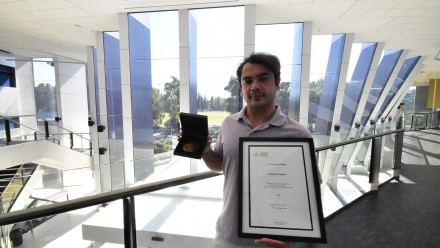The Burr Group - Cancer Immunology and Epigenetics
In the Burr laboratory, we aim to uncover the molecular mechanisms by which cancer cells evade surveillance and control by the immune system, allowing tumours to develop and progress. We employ genome scale CRISPR genetic screening approaches, together with genomic and proteomic technologies, to uncover novel therapeutic targets to enhance immune recognition of cancer cells. We aim to both establish new approaches to enhance the efficacy of existing immunotherapies and develop new immune-based therapies to treat solid and haematological malignancies.
The development of effective immunotherapies, such as antibodies targeting immune checkpoint molecules PD-1/PD-L1 and CTLA-4, have produced remarkable survival benefits in many advanced cancers. These immune checkpoint inhibitors (ICIs) activate tumour reactive T-cells, which drive tumour eradication. Specific detection of malignant cells harbouring mutated or abnormally expressed proteins by T cells relies on recognition of aberrant peptide antigens presented by MHC class I or MHC class II molecules. ICIs have therefore been most effective in cancers with a high mutation (neoantigen) burden. However, even highly mutated tumours are frequently refractory to ICI therapy and research in the Burr laboratory focuses on uncovering the mechanisms by which these cancers escape T-cell mediated immune control.
We have recently identified that epigenetic silencing of genes encoding components of MHC antigen processing and presentation pathways drives immune evasion in certain cancers, and that targeted inhibition of specific chromatin complexes can restore effective anti-tumour immunity. Using CRISPR based screening coupled with cell and molecular biology, and biochemical, genomic, and imaging technologies at bulk and single cell level, our lab aims to understand how dysregulation of immune activating or inhibitory pathways contributes to immune escape in cancer and apply this knowledge to develop novel therapeutic strategies to overcome immunotherapy resistance.
Targeting Menin disrupts the KMT2A/B and polycomb balance to paradoxically activate bivalent genes. Nature Cell Biology. 2023. https://rdcu.be/c3i5t.
Inhibition of the CtBP complex and FBXO11 enhances MHC class II expression and anti-cancer immune responses. Cancer Cell. 2022. 10;40(10):1190-1206. https://www.cell.com/cancer-cell/pdf/S1535-6108(22)00436-6.pdf
An evolutionarily conserved function of polycomb silences the MHC class I antigen presentation pathway and enables immune evasion in cancer. Cancer Cell. 2019. 14;36(4):385-401. Reprinted in Cancer Cell ‘Best of 2019’ . https://www.cell.com/cancer-cell/fulltext/S1535-6108(19)30376-9
The roles of DNA, RNA and histone methylation in ageing and cancer, Nature Reviews Molecular Cell Biology. 2019. 20(10):573-589. https://www.nature.com/articles/s41580-019-0143-1
CMTM6 maintains the expression of PD-L1 and regulates anti-tumour immunity. Nature. 2017. 549: 101-105. https://www.nature.com/articles/nature23643
MHC class I molecules are preferentially ubiquitinated on endoplasmic reticulum luminal residues during HRD1 ubiquitin E3 ligase-mediated dislocation. Proc Natl Acad Sci (PNAS). 2013. 110(35):14290-5. https://www.pnas.org/doi/full/10.1073/pnas.1303380110
HRD1 and UBE2J1 target misfolded MHC class I heavy chains for endoplasmic reticulum-associated degradation. Proc Natl Acad Sci (PNAS). 2011. 108(5):2034-9. https://www.ncbi.nlm.nih.gov/pmc/articles/PMC3033308/













